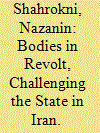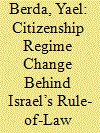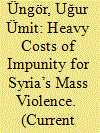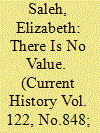| Srl | Item |
| 1 |
ID:
193472


|
|
|
|
|
| Summary/Abstract |
The protests that erupted across Iran in 2022 after the death of a woman arrested for noncompliance with a headscarf requirement were not only about religious dress codes. They were a culmination of years of growing discontent over broader questions involving the place of women in the Islamic Republic and other grievances about the reach of an overbearing state and perceived social and political injustices. The erosion of civil society has made it difficult to sustain the protests’ momentum, as the state moves to co-opt businesses and the public into enforcing its decrees, but the uprising is part of a longer-term, nonlinear process of dissent-driven change in Iran.
|
|
|
|
|
|
|
|
|
|
|
|
|
|
|
|
| 2 |
ID:
193475


|
|
|
|
|
| Summary/Abstract |
This article delineates the relations between the judicial overhaul launched by Israel’s right-wing government in 2023 and the mechanisms of Israel’s control over Palestinians, demonstrating that they are two parts of a regime change. The essay traces a series of changes in Israel’s citizenship regime the past decade: the enactment of an anti-terrorism law and a nation-state law that defined the exclusive right of Jews to self-determination in Israel; the domestic application of surveillance and control practices developed in the occupied territories; and finally legislation allowing the revocation of Palestinians’ citizenship and the de facto annexation of the occupied territories.
|
|
|
|
|
|
|
|
|
|
|
|
|
|
|
|
| 3 |
ID:
193474


|
|
|
|
|
| Summary/Abstract |
Elections under authoritarian regimes rarely deliver democratic outcomes. Still, most observers and pollsters expected Turkey’s May 2023 presidential and parliamentary elections to be different. A deepening economic crisis, a botched rescue effort after a devastating earthquake, and discontent with a ruling party in power for more than two decades seemed to fuel the rise of a united opposition. But the return to democracy did not happen, and this cannot be credited solely to an unlevel electoral playing field. Turkey offers a case study in electoral autocracy, with incumbent tactics of repression and co-optation that disarm opposition parties by drawing them into the logic of autocratic politics.
|
|
|
|
|
|
|
|
|
|
|
|
|
|
|
|
| 4 |
ID:
193477


|
|
|
|
|
| Summary/Abstract |
After more than a decade of armed conflict in Syria, few perpetrators of mass violence have been held accountable for their actions. The Assad regime is the prime sponsor of impunity for these human rights abuses, but global and regional powers also bear responsibility for allowing the perpetuation of atrocities.
|
|
|
|
|
|
|
|
|
|
|
|
|
|
|
|
| 5 |
ID:
193476


|
|
|
|
|
| Summary/Abstract |
Tunisia was the last surviving democracy to emerge from the Arab Spring, and had recently enacted legislation to combat racial discrimination. But President Kais Saied, since coming to power in a 2019 election, has returned the country to authoritarian rule. He has also rolled back progress on race relations, scapegoating sub-Saharan African migrants for Tunisia’s economic troubles. The failure of previous governments to root out corruption and consolidate the democratic transition with a new socioeconomic pact opened the way for a return to dictatorship.
|
|
|
|
|
|
|
|
|
|
|
|
|
|
|
|
| 6 |
ID:
193473


|
|
|
|
|
| Summary/Abstract |
This article draws on narratives from middle-class households in Beirut to examine their disenfranchisement amid the country’s financial collapse. A common expression, “There is no value,” is often used in allusion to extreme price fluctuation that has punctuated everyday life since the end of 2019. The phrase also speaks to the undoing of a middle-class lifestyle that emerged with the pegging of the Lebanese lira to the US dollar in the 1990s. Reflecting on how value is conceptualized at the level of the everyday leads into exploring some of the complex ways in which this middle-class milieu accessed credit following Lebanon’s civil war, and how everything has changed during the current dollar shortage.
|
|
|
|
|
|
|
|
|
|
|
|
|
|
|
|